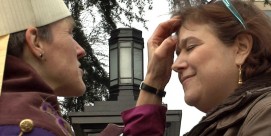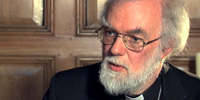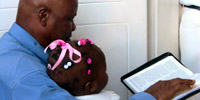In This Episode << SLIDE LEFT TO SEE ADDITIONAL SEGMENTS
Lambeth Report
TIM O’BRIEN, guest anchor: Same-sex unions, as well as the consecration of gay bishops, are among the most contentious issues facing the worldwide Anglican Communion at the Lambeth Conference in England this week. With 77 million members, the Communion is the third largest Christian denomination in the world. Anglicans have been threatened with schism because of deep divisions over homosexual issues and scriptural interpretation. At their once-a-decade meeting, Anglican bishops are not expected to resolve the crisis, but they hope the gathering will ease tensions. Kim Lawton has our report from Canterbury, England.
KIM LAWTON: They came from all over the world and walked into the historic Canterbury Cathedral together, a visible celebration of their common Anglican heritage. But there is sharp disagreement about what it means to be an Anglican today, and the more than 650 bishops at this Lambeth Conference struggled to find a way to hold the Anglican Communion together, despite b divisions about homosexuality and the interpretation of Scripture.
Bishop EUGENE SUTTON (Diocese of Maryland): Our children and children’s children will judge us by what we’ve done today. People may be tired of talking, but when we’re tired of talking about these issues, we are no longer being faithful.
LAWTON: Anglican bishops meet for the Lambeth Conference once every 10 years. In contrast to previous years, organizers of this meeting decided not to hold any policy votes.

Anglican Bishops |
Bishop MARC ANDRUS (Diocese of California): Legislation, report writing, voting — all those things, if you will, are things that we can use to avoid encountering one another.
LAWTON: Instead, they held a series of discussions, many in small groups and Bible studies, as a way to promote dialogue. Tensions were still high. Nearly all the sessions were private, with heavy security all around the circus tent where the main events occurred.
In one speech inside the tent that the media was not allowed to record, Archbishop of Canterbury Rowan Williams challenged both liberals and conservatives to work harder at finding resolutions. He said, “At the moment, we seem often threatening death to each other, not offering life.”
The Anglican Communion is made up of 38 regional bodies or provinces, including the Episcopal Church in the U.S. All those provinces are all autonomous. The Archbishop of Canterbury is the spiritual leader of the Communion but doesn’t have the authority to dictate what happens inside the regional churches. Relationships have been severely strained since the US Episcopal Church consecrated an openly gay bishop, Gene Robinson of New Hampshire, and local parishes began blessing same-sex unions. Leaders of more conservative Anglican churches in Africa, Asia, and South America accused the Episcopal Church of violating Scripture and disregarding centuries of church teachings. About 230 of those leaders boycotted this Lambeth meeting.
Mark Lawrence is a conservative Episcopal bishop from South Carolina.
Bishop MARK LAWRENCE (Diocese of South Carolina): I wish Nigeria was here, Uganda was here, Kenya was here, Rwanda was here, but in a way they are. Their silence speaks volumes, if we’ll only quiet ourselves long enough to recognize their voices here in their absence.
LAWTON: Bishop Gene Robinson was also absent from the official sessions; he wasn’t invited because of the controversy. Nonetheless, he came here to participate in non-official meetings.
Bishop GENE ROBINSON (Diocese of New Hampshire): Actually, being excluded from the conference has been harder than I expected. I thought I was going to be emotionally and spiritually prepared for it, but it’s been harder than I thought to be separated, especially from my own House of Bishops.
LAWTON: Robinson was discussed at numerous points during the meeting, and one Sudanese bishop urged that he resign. Still, Robinson said he was able to quietly meet with several international bishops to introduce himself and tell his story.
Bishop ROBINSON: We’re all here for one purpose, which is to remind the bishops who are meeting that in every one of their congregations, whether they know it or not, there are gay and lesbian people, and we are here to remind them that we’re not going to go away.
LAWTON: This was the first Lambeth Conference where gays and lesbians had a visible presence in events surrounding the meeting, such as this demonstration of traditional African dancing.
This was the first Lambeth meeting for another controversial American figure, Katharine Jefferts Schori, who attended not only as a bishop, but as the Presiding Bishop of the Episcopal Church. Only four of the 38 provinces consecrate female bishops.

Bishop Eugene Sutton |
Bishop SUTTON: Her presence, of course, is pushing the edge for a number of people. They are in societies and cultures where women do not take leadership. I think it’s a marvelous work of the Holy Spirit.
LAWTON: Even with the boycott, the growing influence of leaders from Africa, Asia and South America was clear. Some of the largest and most vibrant Anglican churches are in these so-called Global South regions. American conservatives welcomed their support.

Bishop Mark Lawrence |
Bishop LAWRENCE: In the United States I’m in the extreme minority when I gather in the House of Bishops. But here among bishops from all over the world, I’m in that odd position of being in the majority opinion, and that’s different for me, and I kind of like it, actually.
LAWTON: The bishops discussed a variety of topics and did agree a lot. Last week, they marched through the streets of London urging that global poverty be cut in half by the year 2015. They saved the topics of gender, sexuality, and the Bible for the end of the conference when there was intense debate yet again over how to respond to the Episcopal Church’s actions.
Bishop PETER BECKWITH (Diocese of Springfield, IL): The American Church has gone ahead on its own with the idea that that, “We’re going to go ahead with this because we think it’s appropriate and if you have a problem with it, that’s your problem.” That doesn’t sound like communion to me.
LAWTON: An official crisis working group released a proposal renewing previous calls for a ban on more gay bishops and same-sex blessings. It also called for an end to cross-jurisdictional relationships where conservative US parishes are affiliating with Anglican churches in places like Africa and South America.
Bishop CLIVE HANDFORD (Anglican Communion, speaking at press conference): To pull back, to draw breath, take stock and to better dialogue together as we go forward from here.
LAWTON: The proposal won’t be voted on until 2009, but people on both sides have already said it won’t work. Bishop Marc Andrus from the San Francisco area told the bishops he would not stop blessing same-sex unions.

Bishop Marc Andrus |
Bishop ANDRUS: I wanted them to know that while I have sought to be transparent, that if they didn’t understand that we were continuing to do blessings in the diocese of California, that is the fact and will continue to be the fact, and that I was available to them to tell them why I consider that essential and that it would continue to go on.
LAWTON: Conservatives expect the cross-jurisdictional relationships to continue as well.
Bishop BECKWITH: There’s precedence in the church to cross geographical boundaries when theological boundaries are being crossed, and theological boundaries are being crossed.
LAWTON: There was also intense debate about changing some of the ways the Communion operates. Some bishops are pushing for a broad statement of agreement that would help define who Anglicans are.
Bishop LAWRENCE: There is a limit as to what diversity can allow for in the midst of a family, a community that has to trust one another.
LAWTON: Many bishops are increasingly frustrated by the seeming stalemate, and not surprisingly, there are differing opinions about whether schism can ultimately be avoided.
Bishop BECKWITH: If we don’t change is that Communion going to continue? That remains to be seen, but I would say it’s very questionable.

Bishop Tom Shaw |
Bishop TOM SHAW (Diocese of Massachusetts): On some days I have really significant conversations with individual bishops and in groups, and I get a sense that we really are listening to one another and trying to find a path forward. And then on other days it doesn’t seem like we’re really talking to one another and it’s hard for me to see how we’ll be able to go forward.
Bishop ANDRUS: There will be a Communion. It may look different than the Communion we have today. I think most of the people here will stick with each other.
How can we improve our program or Web site?
LAWTON: Organizers hope this Lambeth Conference has helped the bishops build the relationships needed to hold the Communion together. Many here say they will also need some divine intervention to make that happen.
I’m Kim Lawton in Canterbury, England.






